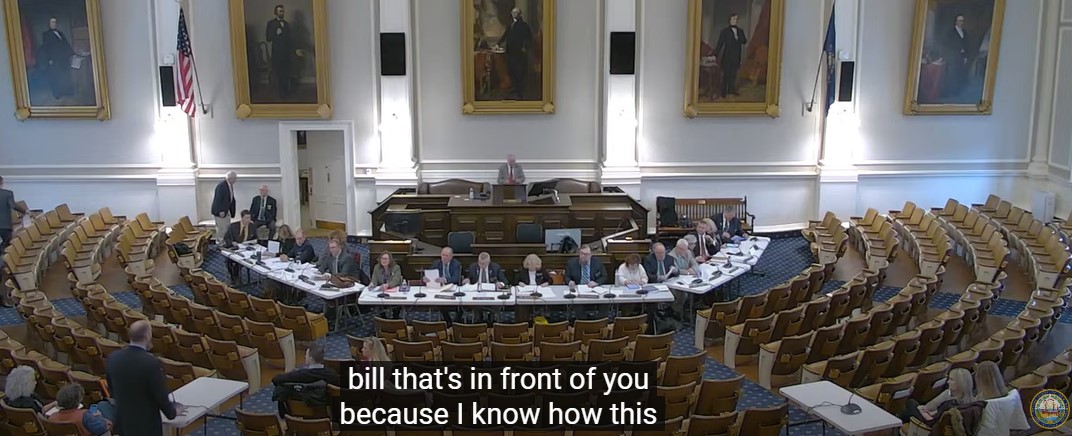By PAULA TRACY, InDepthNH.org
CONCORD – The bipartisan, House leadership-supported bill to legalize, regulate and tax adult use of marijuana went to a committee hearing Wednesday, but judging from comments from Gov. Chris Sununu’s spokesman, this is not the year for it to pass.
House Majority Leader Rep. Jason Osborne, R-Auburn, and House Minority Leader Rep. Matt Wilhelm, D-Manchester, are co-sponsors of House Bill 639 https://www.gencourt.state.nh.us/bill_status/billinfo.aspx?id=532&inflect=2.
Osborne told the House Commerce and Consumer Affairs Committee Wednesday that the state is at a disadvantage, surrounded by other states where the drug is legal. His goal would be to keep the barriers low to avoid big business exploitation and “take the industry away from thugs” and keep taxation low.
The money would be credited to the retirement system which will lower rates for employers.
State Sen. Becky Whitley, D-Hopkinton, and Sen. Donovan Fenton, D-Keene, both stood in support of the bill as “millennials” claiming legalization will allow for more immigration of younger residents.
Wilhelm said it’s time to join the other New England states and legalize recreational use.
Gov. Chris Sununu’s spokesman Ben Vihstadt said in a statement that Sununu has done more on the issues surrounding marijuana reform than any other governor in New Hampshire history.
“After years of inaction by Democrat governors, Chris Sununu signed commonsense decriminalization so no one would be jailed for simple possession of minor amounts of marijuana, expanded access to medical marijuana, and provided a pathway to annul old convictions for marijuana possession.
“It is important to remember that the legislature has never sent a legalization bill to the governor’s desk — it’s failed in the Senate repeatedly, in both Republican-held years and Democrat-held years. With teen drug use and overdoses on the rise, it is not anticipated that the legislature will see this as a time to ignore the data and move it forward,” Vihstadt said.
Some at the hearing warned that legalization can have massive health consequences, particularly for young people and looked to statistics from states like Colorado which has had legalization the longest.
Polls show 74 percent of New Hampshire residents support legalization.
Former state Rep. Susan Homola, R-Hollis, said the data from states which have legalized have not found it to be some panacea, with black markets still thriving.
There are 21 states that have legalized 29 have not, she said. Teen suicide is up in those states that legalized it. Emergency room visits have tripled, she said.
The national veterans’ suicide rates are higher there than in the average state. Since legalization, use by children has increased more than 30 percent, Homola said.
She said in two years since Vermont legalized marijuana, it has become a public health problem.
Homola warned no one should hide behind a banner of freedom.
“It’s about money,” Homola said. “The public deserves an honest discussion.”
When states legalize marijuana, it tends to give the green light to youths, she said.
“I’m just going off the science and doing my best,” Homola said. “I have four kids.”
Tim Egan, a former state representative from Sugar Hill and chair of the state cannabis advisory board, said New Hampshire needs to get with reality.
“We’re losing revenue due to our current, antiquated laws,” Egan said.
New Hampshire can reclaim and share in this revenue, he said.
“In agriculture, retail, and creation of edibles, it is a job creator,” Egan said.
The bill, he said, was designed by a bipartisan coalition looking at what is best for New Hampshire.
He countered Homola’s testimony arguing that youth use is down.
Tourism decisions are based on what people can get in that state, he said, and legalization would improve tourism.
Bedford Police Chief John Bryfonski, representing the New Hampshire Association of Chiefs of Police spoke in opposition to the bill.
He said it used to be that people would say “the jury is not in,” but today he said, “the facts are before you and undeniable.”
The legalization and commercialization of cannabis is creating a health risk, particularly among youths, he said. It has cost tragedy and chaos on highways, he said, and threats to children with edibles.
“You can make money but really is this about money,” he said. “It’s more about public safety and public health.”
He noted Massachusetts, which legalized pot is having some negative revenue issues with it.
House Bill 544 was also heard relative to the taxation of the drug if it is to be legalized and sold.






